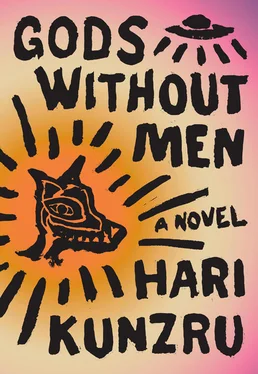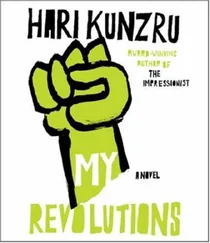“Gershwin,” he explained, taking off the headphones. “I do it every so often. You know, with the buildings? I’m sure I shouldn’t. It’s probably fattening. What can I do for you?”
“I need to talk.”
“So go ahead.”
“Cy, you once told me we were cheating, gaming the system.”
“Yes?”
“Well, I think we should stop. Walter’s — well, it’s very deep in the guts of the financial markets. I feel as if it has the power to — I mean — I don’t know what I mean, Cy. But I’ve been thinking a lot. Walter has the potential to be very disruptive. I can’t help being worried. About consequences, unintended effects.”
“These unintended effects being what, exactly?”
“Instability. Increased volatility.”
“We’re properly hedged, Jaz. You don’t need to worry about the firm.”
“I don’t just mean us. I’m kind of tired, so I’m probably not expressing myself too well. Take the Honduran thing, for example. Walter crashed their currency. Just like that, in a morning.”
“Walter didn’t do any such thing. Sentiment moved against the lempira.”
“We fucked their country.”
“That’s a little dramatic, Jaz.”
“And at the same time, the BRVM and Thai stocks moved in the same way. If Walter can do that, what else can it do? And it’s getting better. More sophisticated. What happens when we use the same techniques at high speed? Too fast for actors in the market to respond?”
“It’s operating exactly as we built it to. It’s a heuristic trading engine, Jaz. It’s learning as it goes along.”
“I know Fenton is authorizing larger volumes. What if Walter does something else like that? What if it does something systemic?”
“Systemic? You think we’re about to crash the global economy? And you get this from a medium-size win for our currency arbitrage strategy? When I last looked, this wasn’t the Fed, Jaz. We’re a hedge fund, not the People’s Bank of China.”
“I just think we should consider pulling back.”
Bachman laughed. “Don’t let Fenton hear you talk like that.”
“You’re not taking this seriously.”
“Trust me, I understand. You feel a little queasy about that trade. On corporate social responsibility grounds, whatever you want to call it. But we didn’t cause anything elsewhere. Shit happens, Jaz. If it wasn’t us, it would have been someone else. You won’t feel so bad when you get your bonus. I expect we’ll soon be neighbors up in Montauk. Perhaps your wife could get on one of the museum boards.”
“What happened to the face of God? You usually talk as if we’re about to discover the secret of the universe.”
“Are you all right, Jaz? Is everything OK at home?”
“Yes, everything’s OK at fucking home. Why won’t you listen to me?”
“Calm down. It’s a model. It’s not causing anything. You’re mistaking the map for the territory.”
“We’re trading on the model. We’re acting.”
“Jaz, Walter won’t even exist in two years’ time. At least not in this iteration. The market is going to adapt. When that happens, we’ll need a new tool. All we’re doing is contributing to market efficiency, and as efficiency increases, our profits will drop. We’ll move on. Life will go on.”
“Why don’t you understand? I’m trying to say I believe you! I think I finally get what you’ve been trying to tell me all along. That it isn’t about money. That we’re messing with something — something fundamental.”
“I don’t know what to say. You’re talking like some villager waving a pitchfork in a Frankenstein movie. You want to burn the witch? Tie old Cy Bachman to a stake?”
And then he started using stock phrases. Take a few days. Get some rest. It was only when Jaz was riding the subway back to Brooklyn that he realized he’d just walked the plank.
The sun hammered down. The pool was glittering blue glass. Behind the roofline of the motel cabins, the sawteeth of the mountains rose up against the sky like a graph of profit and loss. Fenton Willis’s braying voice came through his cell phone as a tinny rasp, as he watched Raj trying to stack plastic chairs by the hot tub. The sound of New York. You can run but you can’t hide. Well, every blocked drain and pretzel vendor and gala fund-raiser and overpriced apartment in the whole fucking city could go to hell. This was as much as he could cope with: an almost-empty world, a jumble of rocks and sand.
“I’ve got to go, Fenton. I’m sorry.”
He ended the call, stared down at his BlackBerry like a gun that had accidentally gone off in his hand. No one hung up on Fenton Willis. No one. So that was it. No more Walter. No more firm. That was him done. He felt, for the first time in months, a profound sense of peace.
It was as simple as that. Step by step, she walked away from the town and into the Command, which absorbed her into its structure like a big soap bubble incorporating a little one.
Bubbles, said Wolf, were a good way to think about the future. Soon buildings would be more like them, soft and fluid, free to float away at any time and attach themselves to another cluster. At a moment’s notice you could change your mind about how you lived. You could be part of a city, or a village, or stay on your own. Just untether yourself from your surroundings and go. That, he told her, was what freedom looked like.
Dawn didn’t know much about freedom. All she knew was the life she wanted didn’t include working at the store or grappling on the backseat of Frankie’s Plymouth or her uncle running her over with his eyes all the time like she was something good to eat.
There were about ten of them. They lay out on the rocks by the Indian signs, climbing a route she’d known since she was a kid. The whorls and crosshatched lines scraped into the red-black varnish. The white bed of the dry lake leading away toward the mountains. They passed a joint. Someone was tapping out a slow, soft rhythm on a drum. Wolf laughed and stretched out flat, sunning himself on a ledge. Dawn peered over the lip at the construction going on below. Beneath the overhang, in a hollow whose roof was about fifty feet off the ground, nestled the half-finished skeleton of a dome, like a broken eggshell. People were clambering over it, winching up metal poles welded into triangular struts, bolting them to the structure. Raggle-taggle freaks in Goodwill finery, spidering over a huge frame. Already the cluster of huts and trailers where they lived seemed small and temporary.
From one of the huts emerged a long tail of cable. It snaked its way under the rocks, where it disappeared into a hole.
“What’s that down there?”
Wolf glanced down. “Oh, that’s my brother. He’s probably under us right now, listening.”
“Listening?”
“That’s what he does. He’s sneaky that way.”
“Did I meet him?”
“I don’t think so. You’d remember if you had. He looks like me, only uglier. Slant eyes, long nose?”
She laughed. “I don’t think I met anyone like that.”
“Like I said, you’d remember.”
As the summer wore on, Dawn spent most of her free time at the rocks, hanging out with Wolf and his friends. There were so many people to get to know. Pilgrim Billy and Floyd and Sal and Marcia and Yucca Woman and the Sky Down Feather Brothers. They were all older than her and about the most interesting and different personality types you could imagine. They were scary too, in a not-quite-good way with their weird talk about reintegration and the land of the dead and the community of the whatever-they-were planets. The person who freaked her out most was one-eye Clark Davis. He dressed like a fool, in a panama hat and Keds and a sort of biblical bedsheet robe. He must have been handsome once, in an old-fashioned Errol-Flynnish style. Before his accident.
Читать дальше












